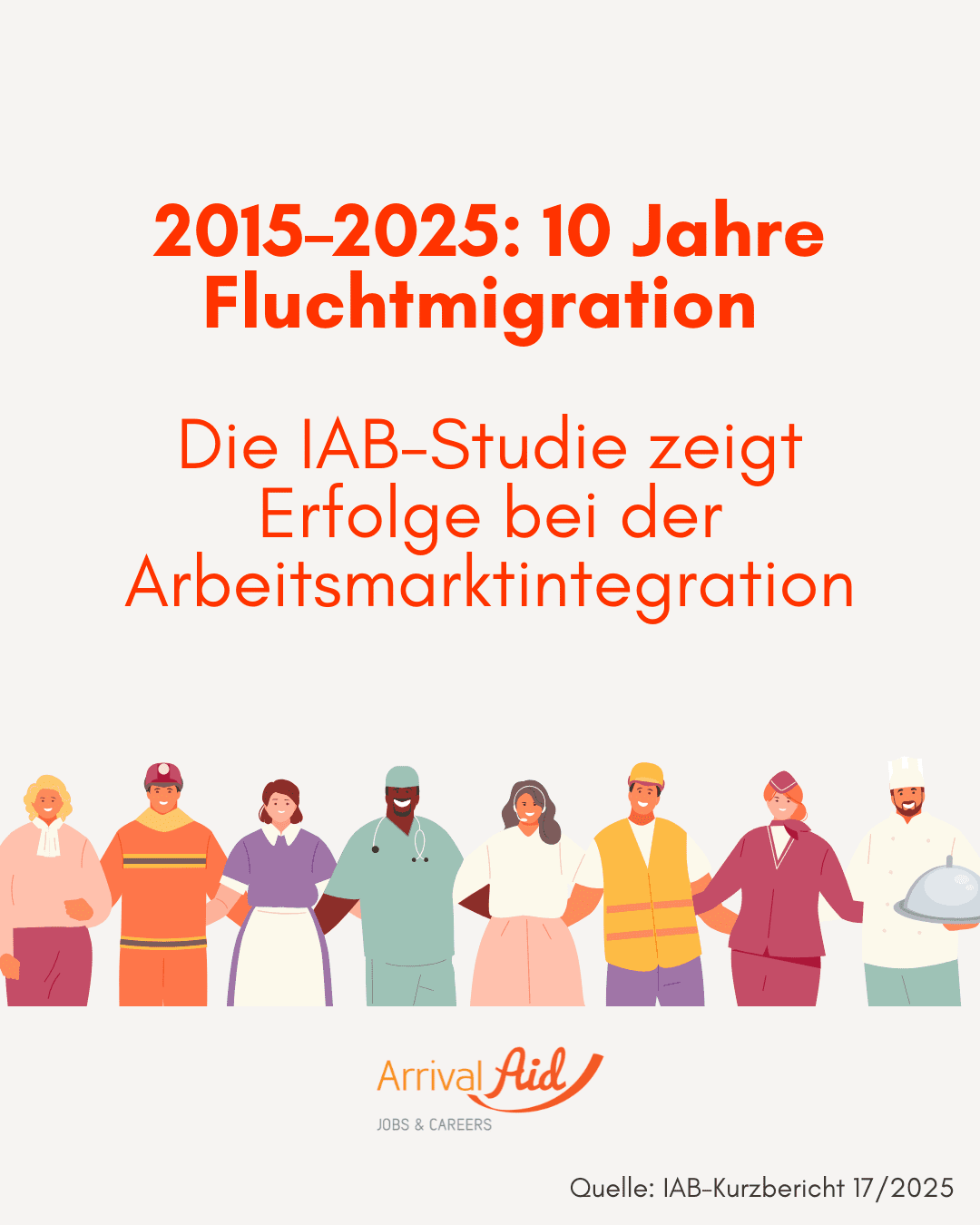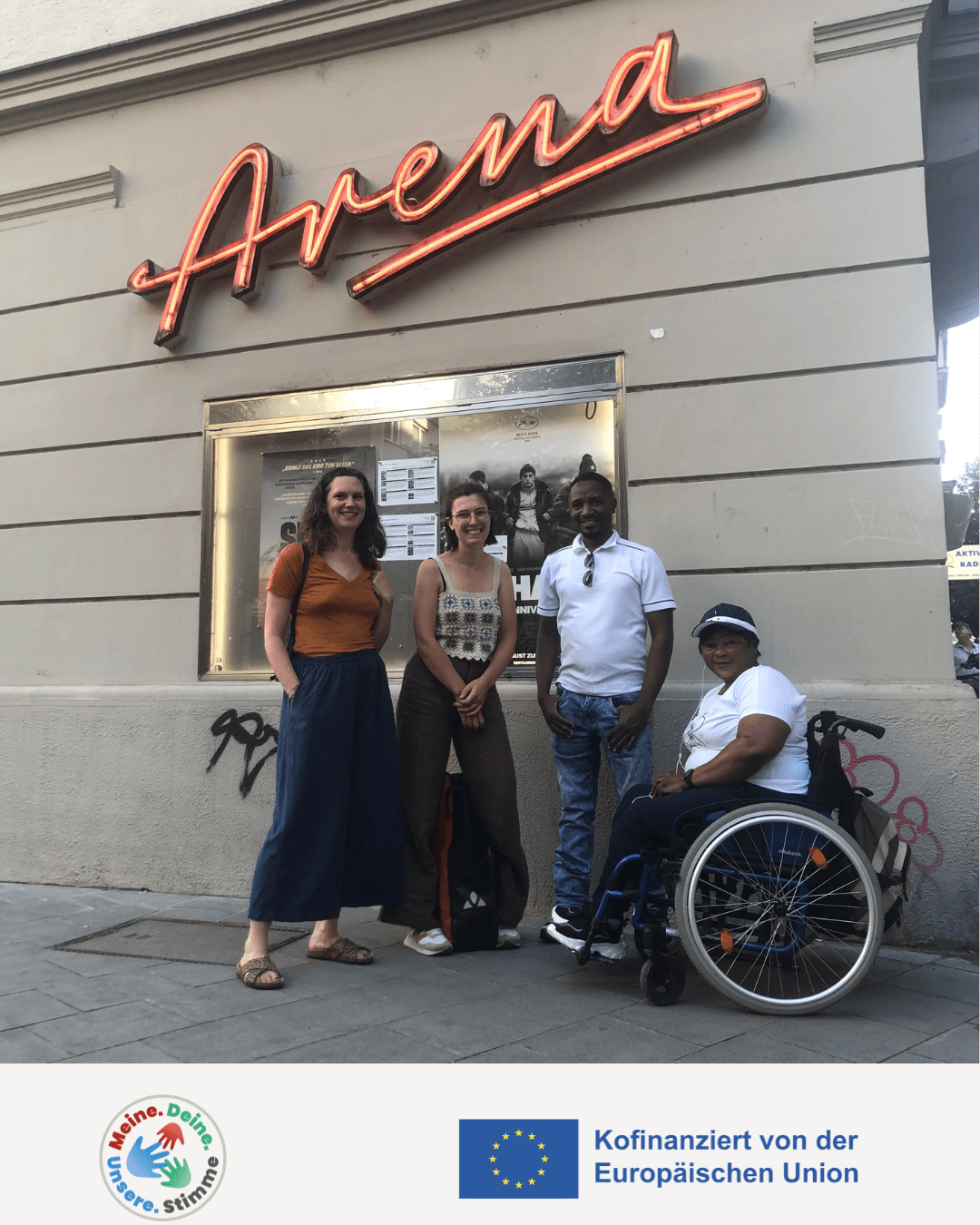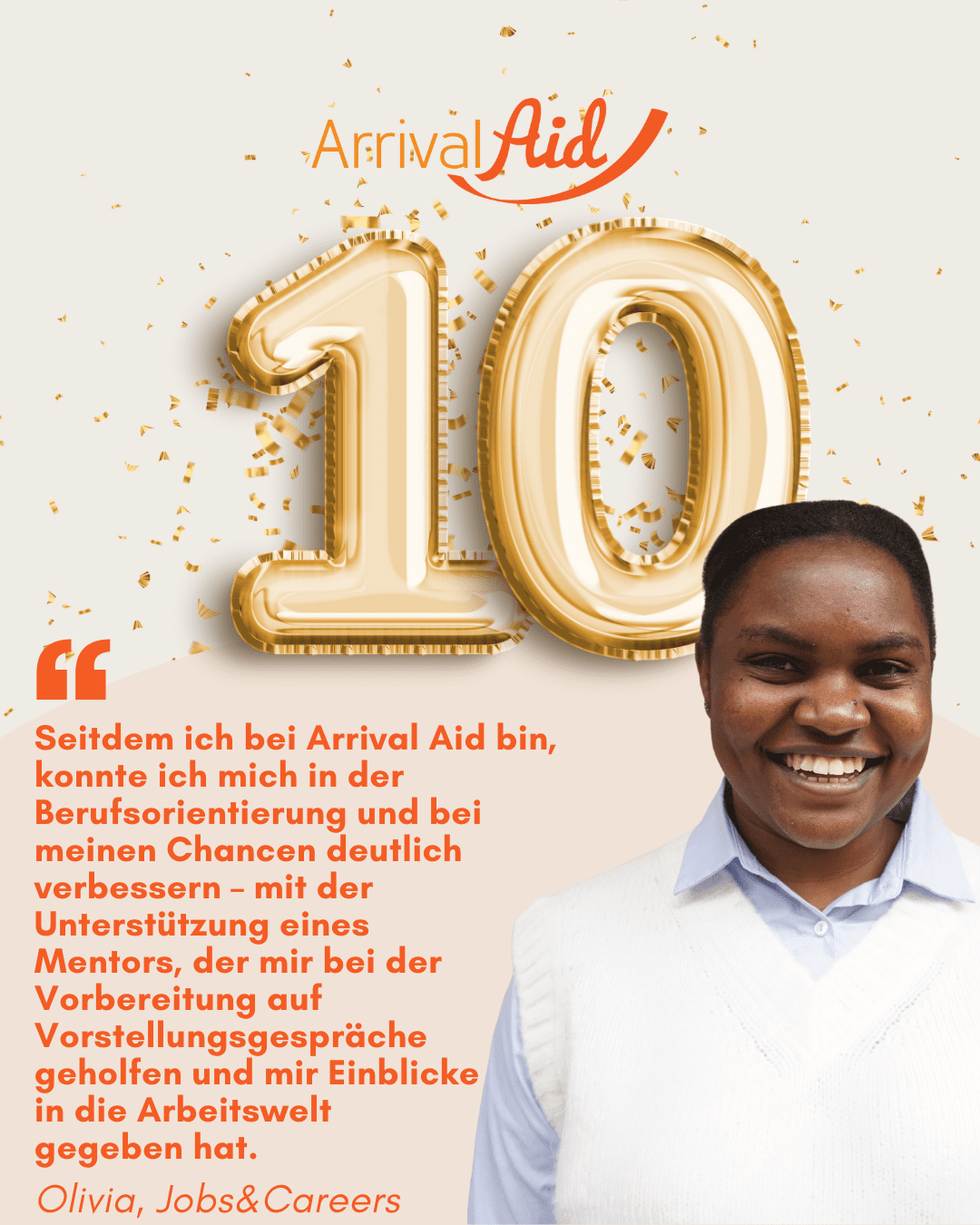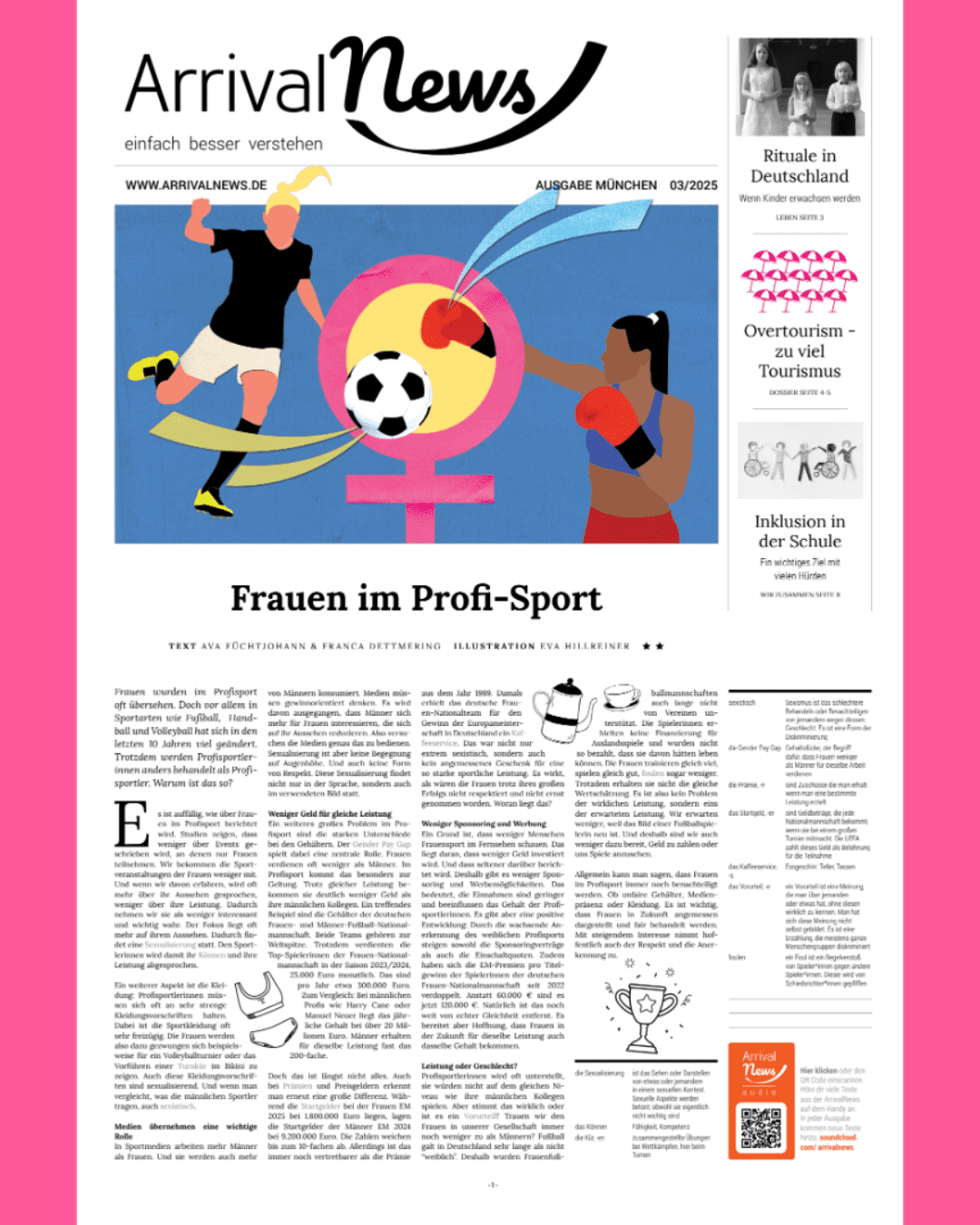Current news - here in the blog

Fachtag „Arbeit inklusiv denken – Wege sichtbar machen. Chancen schaffen“ in Regensburg
Kathi und Markus von Ability Aid waren am 25.09.2025 beim Fachtag „Arbeit inklusiv denken – Wege sichtbar machen. Chancen schaffen“ in Regensburg dabei. Vormittags gab es spannende Vorträge von verschiedenen Organisationen – mit dem Fokus darauf, wie geflüchtete Menschen mit Behinderung besser ins Arbeitsleben integriert werden können. Am Nachmittag ging es in den Austausch: In Kleingruppen haben wir gemeinsam mit anderen Teilnehmenden Ideen gesammelt und gebündelt, wie man konkrete Hürden abbauen und Zugänge erleichtern kann. Es war ein offener und inspirierender Austausch – schön zu sehen, dass alle das gleiche Ziel verfolgen: mehr Teilhabe und Chancen für alle!
25. September 2025

2015-2025: 10 Jahre Fluchtmigration
Die IAB-Studie zeigt Erfolge bei der Arbeitsmarktintegration Zehn Jahre nach der Ankunft vieler Geflüchteter in Deutschland zeigt sich: Die Integration in den Arbeitsmarkt macht große Fortschritte. Laut einer aktuellen Studie des Instituts für Arbeitsmarkt- und Berufsforschung (IAB) liegt die Beschäftigungsquote inzwischen bei 64 %.
Die Studie zeigt, dass Maßnahmen wie Sprach- und Integrationskurse wesentlich zum Erfolg beigetragen haben. Viele Geflüchtete arbeiten heute in systemrelevanten Berufen – etwa im Gesundheits- oder Sicherheitsbereich. Trotz dieser positiven Entwicklung bestehen weiterhin Herausforderungen: Männer sind häufiger beschäftigt als Frauen, die Löhne bleiben oft unter dem Durchschnitt, und die Integration verläuft in Westdeutschland deutlich besser als im Osten. Fazit: Über die Hälfte der Menschen mit Fluchterfahrung ist heute Teil des Arbeitsmarkts – ein wichtiger Erfolg nach zehn Jahren. Dennoch bleibt Handlungsbedarf, vor allem bei Gleichstellung, fairer Bezahlung und regionaler Gerechtigkeit.
01. Oktober 2025

Jobs & Careers: Wie läuft eigentlich ein Vorstellungsgespräch ab?
Letzte Woche fand ein spannender Workshop zum Thema Vorstellungsgespräche statt – mit Klient*innen von ArrivalAid gUG und Mitarbeitenden von Amazon.
Nach einem kurzen Theorie-Input zum Ablauf eines Interviews konnten alle Teilnehmenden in Rollenspielen praxisnah üben. Die Rollenspiele wurden von den Amazon-Mitarbeitenden begleitet, die wertvolle Tipps und Feedback aus der Praxis gaben. Das Ergebnis: Ein lebendiger Austausch, in dem nicht nur Interviewtechniken trainiert wurden, sondern auch gegenseitige Lebensrealitäten und Herausforderungen bei der Jobsuche sichtbar wurden.
Neben solchen Workshops gibt es bei uns viele Möglichkeiten für ein regelmäßiges Engagement – zum Beispiel im Rahmen unseres Programms Jobs&Careers, das Menschen mit Flucht- und Migrationsgeschichte bei der Integration in den Arbeitsmarkt unterstützt.
18. September 2025

MDUS: Filmabend der Selbstvertretungsgruppe: „Die zärtliche Revolution“
Gestern war ein Teil unserer Selbstvertretungsgruppe im Kino – und hat den bewegenden Dokumentarfilm „Die zärtliche Revolution“ gesehen. Vier sehr unterschiedliche Menschen zeigen darin, was Fürsorge in einer solidarischen Gesellschaft bedeuten kann.
Der Film begleitet:
Arnold, pflegender Vater, der für mehr Sichtbarkeit kämpft
Bożena, 24-Stunden-Pflegerin, die faire Arbeitsbedingungen fordert
Amanda, Klimaaktivistin aus Peru, die sich für Mensch und Natur einsetzt
Samuel, Rollstuhlnutzer, der sich für inklusives Wohnen engagiert
Gemeinsam zeigen sie: Solidarität kann Leben verändern.
Für unsere Gruppe war es ein sehr schöner Abend – der Film hat uns berührt, zum Nachdenken angeregt und viele Gespräche ausgelöst.
Filmtipp:
„Die zärtliche Revolution“ läuft am 30. August noch einmal im Arena Filmtheater in München – und in vielen weiteren Städten.
Alle Kinotermine findet ihr hier:
www.wfilm.de/die-zaertliche-revolution/kinotermine
Unsere Empfehlung: Unbedingt anschauen!
27. August 2025

Stimmen über ArrivalAid – 10 Jahre ArrivalAid bedeutet…
Zum zehnjährigen Jubiläum von ArrivalAid blicken wir nicht nur auf Erfolge zurück – wir feiern vor allem die Menschen, die unsere Arbeit möglich machen: Klientinnen, Kolleginnen, Ehrenamtliche, Praktikantinnen und Unternehmenspartnerinnen. In dieser Galerie teilen sie ihre ganz persönlichen Eindrücke, Erfahrungen und Wünsche – und zeigen, was ArrivalAid für sie bedeutet. Danke an alle, die ArrivalAid in den letzten zehn Jahren begleitet und mitgestaltet habe

Die September Ausgebe der ArrivalNews ist da
Die ArrivalNews ist unsere Zeitung in einfacher Sprache – für alle, die Deutsch lernen und gleichzeitig mehr über das Leben und die Gesellschaft in Deutschland erfahren möchten. Mit Artikeln zu Alltag, Arbeit, Kultur, Integration und regionalen Tipps bietet sie Information und Sprachförderung in einem. Diesmal erwarten euch Geschichten und Einblicke aus verschiedenen Lebensbereichen. Wir berichten über Frauen im Profi-Sport und zeigen, wie sie ihren Weg gehen. Außerdem gibt es die Geschichte von Ben – vom Ankommen in Deutschland und der Suche nach einer Ausbildung. Wir beleuchten Rituale, die Kinder und Jugendliche beim Erwachsenwerden begleiten, und stellen Berufe vor, die in Deutschland Chancen bieten. Globale Themen wie Overtourism und wichtige Fragen der Inklusion in der Schule runden die Ausgabe ab. Für junge Leser*innen gibt es eine spannende Geschichte über das Reisen und Entdecken der Welt.
Die Themen der Ausgabe 9/2025 im Überblick:
- TITEL: Frauen im Profi-Sport – von Ava Füchtjohann & Franca Dettmering; Illustration von Eva Hillreiner
- GOOD NEWS, EVERYONE: Ben Sukari´s Reise der Residenz und Hoffnung – von Sarah Namala
- LEBEN: Wenn Kinder erwachsen werden – Rituale in Deutschland – von Alena Schäberle
- DOSSIER: Overtourism – Zu viel Tourismus – von Ava Füchtjohann, Franca Dettmering & Magdalena Klee
- ARBEIT: Zweiradmechatroniker in Deutschland – von Martin Rubin
- WIR ZUSAMMEN: Inklusion in der Schule – Ein wichtiges Ziel mit vielen Hürden – von Johanna Bueß
- KINDER- UND JUGENDSEITE: Wie man die ganze Welt bereisen könnte – von Nadezhda (16 Jahre)
- KOMPASS: Regionale Tipps für München, Köln / Düsseldorf, Hamburg, Frankfurt a.M. und Stuttgart sowie vieles mehr!
- Wie immer begleitet von Stellenanzeigen und Infos vor Ort in der Rubrik MARKTPLATZ
10. September 2025
2015 – 2025: 10 Jahre Fluchtmigration
Die IAB-Studie zeigt Erfolge bei der Arbeitsmarktintegration
Zehn Jahre nach der Ankunft vieler Geflüchteter in Deutschland zeigt sich: Die Integration in den Arbeitsmarkt macht große Fortschritte. Laut einer aktuellen Studie des Instituts für Arbeitsmarkt- und Berufsforschung (IAB) liegt die Beschäftigungsquote inzwischen bei 64 %.
Die Studie zeigt, dass Maßnahmen wie Sprach- und Integrationskurse wesentlich zum Erfolg beigetragen haben. Viele Geflüchtete arbeiten heute in systemrelevanten Berufen – etwa im Gesundheits- oder Sicherheitsbereich.
Trotz dieser positiven Entwicklung bestehen weiterhin Herausforderungen: Männer sind häufiger beschäftigt als Frauen, die Löhne bleiben oft unter dem Durchschnitt, und die Integration verläuft in Westdeutschland deutlich besser als im Osten.
Fazit: Über die Hälfte der Menschen mit Fluchterfahrung ist heute Teil des Arbeitsmarkts – ein wichtiger Erfolg nach zehn Jahren. Dennoch bleibt Handlungsbedarf, vor allem bei Gleichstellung, fairer Bezahlung und regionaler Gerechtigkeit.
01. Oktober 2025
Fachtag „Arbeit inklusiv denken – Wege sichtbar machen. Chancen schaffen“ in Regensburg
Kathi und Markus von Ability Aid waren am 25.09.2025 beim Fachtag „Arbeit inklusiv denken – Wege sichtbar machen. Chancen schaffen“ in Regensburg dabei.
Vormittags gab es spannende Vorträge von verschiedenen Organisationen – mit dem Fokus darauf, wie geflüchtete Menschen mit Behinderung besser ins Arbeitsleben integriert werden können.
Am Nachmittag ging es in den Austausch: In Kleingruppen haben wir gemeinsam mit anderen Teilnehmenden Ideen gesammelt und gebündelt, wie man konkrete Hürden abbauen und Zugänge erleichtern kann.
Es war ein offener und inspirierender Austausch – schön zu sehen, dass alle das gleiche Ziel verfolgen: mehr Teilhabe und Chancen für alle!
25. September 2025
Jobs & Careers: Wie läuft eigentlich ein Vorstellungsgespräch ab?
Letzte Woche fand ein spannender Workshop zum Thema Vorstellungsgespräche statt – mit Klient*innen von ArrivalAid gUG und Mitarbeitenden von Amazon.
Nach einem kurzen Theorie-Input zum Ablauf eines Interviews konnten alle Teilnehmenden in Rollenspielen praxisnah üben. Die Rollenspiele wurden von den Amazon-Mitarbeitenden begleitet, die wertvolle Tipps und Feedback aus der Praxis gaben.
Das Ergebnis: Ein lebendiger Austausch, in dem nicht nur Interviewtechniken trainiert wurden, sondern auch gegenseitige Lebensrealitäten und Herausforderungen bei der Jobsuche sichtbar wurden.
Neben solchen Workshops gibt es bei uns viele Möglichkeiten für ein regelmäßiges Engagement – zum Beispiel im Rahmen unseres Programms Jobs&Careers, das Menschen mit Flucht- und Migrationsgeschichte bei der Integration in den Arbeitsmarkt unterstützt.
18. September 2025
Stimmen über ArrivalAid – 10 Jahre ArrivalAid bedeutet…
Zum zehnjährigen Jubiläum von ArrivalAid blicken wir nicht nur auf Erfolge zurück – wir feiern vor allem die Menschen, die unsere Arbeit möglich machen: Klientinnen, Kolleginnen, Ehrenamtliche, Praktikantinnen und Unternehmenspartnerinnen.
In dieser Galerie teilen sie ihre ganz persönlichen Eindrücke, Erfahrungen und Wünsche – und zeigen, was ArrivalAid für sie bedeutet.
Danke an alle, die ArrivalAid in den letzten zehn Jahren begleitet und mitgestaltet habe
